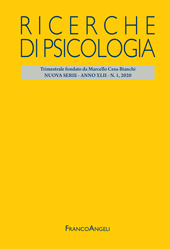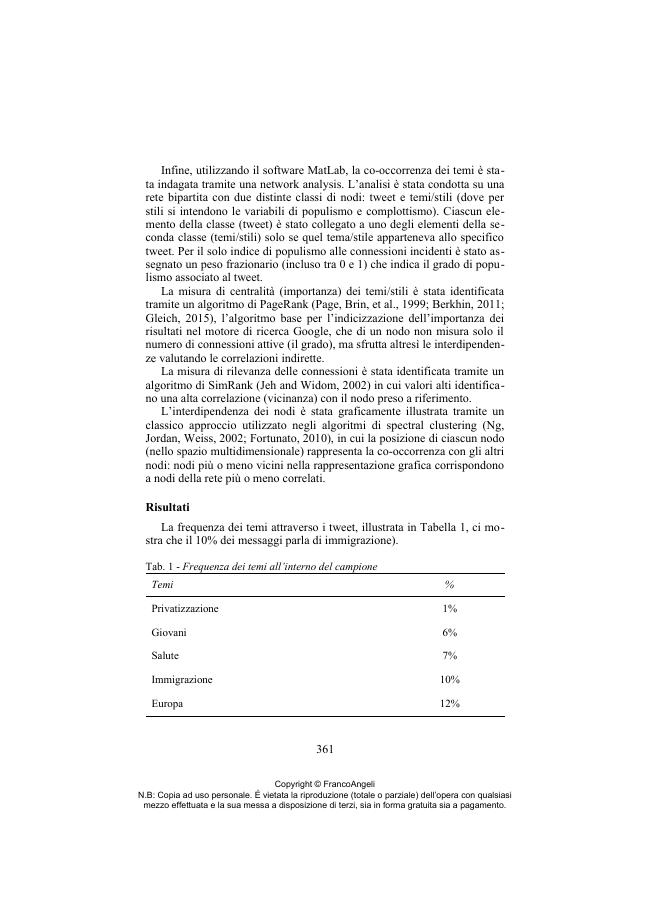2020 - Franco Angeli
Article
Digital Version
Télécharger | Copier/coller | Impression
Immigrazione, stili e temi : uno studio sui tweet dei politici italiani
351-371 p.
- L'immigrazione e stato uno dei temi piu rilevanti nelle campagne politiche relative al referendum sulla Brexit, alle presidenziali americane e alle elezioni parlamentari italiane ed europee (es. Zappettini, 2019; Faris, Roberts, Etling, Bourassa, Zuckerman, & Benkler, 2017). In particolare si è potuto assistere a un incremento di consensi per i gruppi politici piu avversi agli immigrati/e e ai flussi immigratori (Muis e Immerzeel, 2017). In questo studio indaghiamo, attraverso l'analisi testuale di 1000 tweet appartenenti ai principali leader politici italiani, quali tematiche sono associate prevalentemente a contenuti negativi o positivi nei confronti dell'immigrazione. I risultati mostrano che i messaggi negativi sono associati, in un modello di regressione lineare logistica, a uno stile di comunicazione populista e all'idea della presenza di complotti.
- Inoltre, una network analysis rivela che messaggi anti-immigrazione sono associati ai temi di sicurezza e giustizia, mentre i messaggi pro-immigrazione sono associati alla tematica dei diritti civili, cultura ed Europa. Vengono quindi discussi gli elementi stilistici propri della comunicazione populista e complottista in relazione alla diffusione di contenuti anti-immigrazione e le possibili conseguenze per la trasmissione e la formazione di valori nel contesto dei social media. [Testo dell'editore].
- Immigration has been one of the most relevant topics during the Brexit Referendum, United States presidential election, and Italian and European Parliament elections (e.g., Zappettini, 2019; Faris, Roberts, Etling, Bourassa, Zuckerman, & Benkler, 2017). In particular, during these events, the anti-immigration-politicalgroups gain consensus (Muis and Immerzeel, 2017). In this study, we investigate, with a text-analysis of 1000 Italian political leaders' tweets, which topics are associated with negative or positive sentiment toward immigrants. The results show that negative messages are associated, in a logistic regression model, with a populistic communication style, and with conspiracy suspicions. Moreover, a network analysis reveals that anti-immigration messages are associated with security and justice topics, whereas pro-immigration messages are associated with the topics of civil rights, culture, and Europe.
- Stylistics elements of populist and conspiratorial communication and their relation with the diffusion of anti-immigration contents and related consequences on composition and transmission of values, in social media context, are discussed. [Publisher's text].
Fait partie de
Ricerche di psicologia : 1, 2020-
Informations
Code DOI : 10.3280/RIP2020-001016
ISSN: 1972-5620
KEYWORDS
- Immigrazione, populismo, complottismo, social media, comunicazione politica
- Immigration, populism, conspiratorial communication, social media, politics communication
-
Dans le même fichier
- Introduzione : studi psicologici italiani sull'immigrazione
- Migrazioni e psicologie : introduzione al Forum
- Identità multiple, connessione sociale e attivismo sociale : un modello esplicativo in adolescenti immigrati e italiani
- Mutual intercultural relations among immigrant and autochthonous youth in Italy : testing the integration, multiculturalism, and contact hypotheses
- Reti sociali, strategie di acculturazione e benessere dei rifugiati in Italia
- Religione e identità multiculturali nelle seconde generazioni di musulmani in Italia
- Dimensioni identitarie e sentimenti verso gli outgroup religiosi nella migrazione musulmana in Italia
- Immigrazione e genitorialità : cognizioni genitoriali in infanzia
- Dipendenze tecnologiche e rischio evolutivo : confronto tra minori con background migratorio e minori italiani su prevalenza e correlati maladattivi
- Evidenze cliniche, psicosociali e neuropsicologiche su un campione di pazienti cronici immigrati in Italia
- Maternità e migrazione : rischio psicosociale e sintomi depressivi nel periodo del post partum
- L'efficacia degli interventi psicologici sulla depressione, ansia e somatizzazione nei migranti
- Servizi sanitari, migrazione e diversità : prospettive sull'implementazione della competenza culturale
- Lo studio dell'adattamento scolastico e dell'inclusione sociale degli studenti immigrati in Italia : sfide metodologiche ed evidenze empiriche
- Bullismo etnico : chi sono coloro che aggrediscono compagni con background migratorio?
- Immigrazione, stili e temi : uno studio sui tweet dei politici italiani
- Ringraziamento ai Referee
- Norme per gli autori



